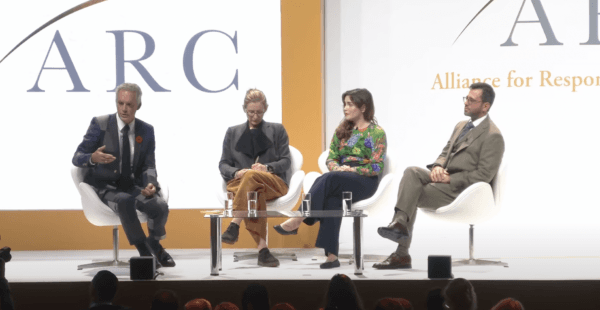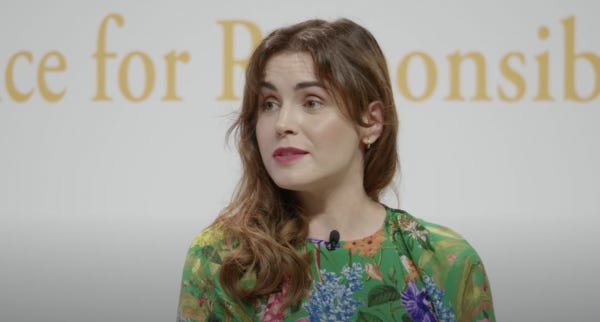Are Women the Biggest Losers of the Sexual Revolution?
ARC pundits tread familiar ground, omit much
I had hoped to honor my invitation to the ARC (Alliance for Responsible Citizenship) Conference last week in London but was prevented from attending by a bout of illness. Perhaps that’s just as well, as my head might have exploded if I’d been in the audience for this, a panel on the “Sexual Revolution.”
On the subject of widespread sexual promiscuity, family breakdown, and fatherless homes, pundits Jordan Peterson, Louise Perry, Mary Harrington, and Stephen Blackwood carefully ignored the hulking feminist elephant in the room, arguing that the primary victims of the sexual revolution have been women (and children as well, as something of an afterthought). The primary beneficiaries have been a few psychopathic men who have left a trail of broken hearts and rudderless children in their wake. It’s a convenient thesis in a culture terminally averse to criticizing women, but it avoids some important facts.
The whole discussion, actually, begins from a false premise. If there was ever a sexual revolution in which we all simply consented to do what we wanted sexually, as Louise Perry claimed, that revolution ended over 30 years ago when Anita Hill complained before a Senate Judiciary Committee that Clarence Thomas, former chair of the Equal Employment Opportunity Commission, should not be confirmed as a Supreme Court Justice because he had once joked to her about a pubic hair floating on his Coke. At that point, the alleged sexual vulnerability of women, whose sensitive ears must not be subject to comments by male colleagues about pornography or penis size—and the need for legislation to protect and accommodate them at the expense of male freedom of expression—reasserted itself with a vengeance. The feminist claim that women merely wanted equal rights and an end to sexual double standards was exposed as a feeble lie.
Sexual harassment legislation soon made it a potential firing offence for a man to make a female workmate uncomfortable, whether by standing too close, looking too intently, or making the wrong joke or comment. Later, the #MeToo movement proclaimed it righteous that any man who had ever been sexual with any woman (or even just any man, who didn’t even have to know the woman smearing his name) could be accused of sexual misconduct, fired from his job, and permanently disgraced (the DAMN Handbook contains an extraordinary list of celebrity men destroyed by allegations in 2017 alone; see pp. 8-17). Free love, if it ever existed, has been dead for a long time, and some of the same women who cheered on the idea of sexual freedom were the ones who killed it.
But #MeToo, false allegations, the ever-expanding territory of sexual misconduct, and the anti-male tenor of nearly every public discussion about sex—these were emphatically not the focus of the ARC panel, which zeroed in on female sexual victimization. The goals that countless women have proclaimed necessary—sexual freedom, abundant birth control, single motherhood—were criticized as harms for women. We heard that the medium to long-term well-being of women and children has been sacrificed to the short-term gratification of a minority of men; and that these men also tend to be, according to Peterson, possessed of psychopathic, Machiavellian, narcissistic, and sadistic tendencies. Amongst the fallout are the 50% of British children raised in homes without fathers.
It was stirring stuff, certainly, though not exactly a new proposition. Radical feminists like Sheila Jeffries have long argued (in her book Anticlimax: A Feminist Perspective on the Sexual Revolution and elsewhere) that the sexual revolution merely affirmed and updated the victimization of women by men while conservative non-feminists like Phyllis Schlafly pointed out how feminist policies and laws have disadvantaged women.
Yet even those of us without doctorates in psychology might wonder how it could be true that so many women have been the innocent and unwitting victims of men even when they themselves chose those men. Are there not women who engage in abundant casual sex with as much blithe indifference as the men; some of them too psychopathic, narcissistic, Machiavellian and cruel? Why have so many women over the years championed the loosening of sexual mores—including the availability of abortion, never mentioned by any of the panelists—if it was not in their own best interests to do so?
Or are these panelists saying that women cannot be trusted to know their own best interests and those of their children? Why do so many women continue to embrace sexual hedonism, abortion, and divorce? In reality, the epidemic of fatherlessness, as nobody on the panel was interested in exploring, is not the result of the sexual revolution per se, but was made possible specifically by the rise of no-fault divorce and child support laws that, in feminist-compliant family courts, made it highly attractive for women to discard their husbands while still living off his earnings (divorce is today initiated by women in about 70% of cases, and is one of the major reasons so many young men today are averse to marriage). It may well be that nobody’s long-term well being is served by this reality, but it is what women have been choosing with their eyes wide open for many years, and it is a bit rich now to pretend it was something done to them without their consent.
From its earliest incarnations, the feminist movement gained traction with women by championing the liberation of female sexuality, escape from the constraints of marriage, and freedom from motherhood and housework. Many women continue to demand these as their due (and more). And given that it was a focus on women’s demands and alleged dissatisfactions that brought us to where we are now, perhaps a more balanced discussion about the fruits of sexual liberation might be salutary. Neither man on the panel discussed male experience specifically except in relation to aggression and exploitation, never in terms of legitimate male needs, male desires, or male well-being. Nobody discussed the needs of children.
The intense interest in female unhappiness is a characteristic of civilized societies everywhere, but it’s time to consider that we might all be better off with a little less of it. While women have, undoubtedly, been harmed by feminism and all women negatively affected by it (I certainly have been, and I have empathy for every woman betrayed by feminist claims), it’s impossible for a fair-minded person to conclude that women are its primary victims. After all, many women have materially and in other ways profited by it enormously. Freed of responsibility and even merited shame, some number of women have been protected, promoted, and blessed: celebrated in the mass media, honored in public culture, sought after in business and academia, deferred to by politicians, sanctified in religious cultures beyond their deserts, and protected in the courts from the consequences of their bad actions.
Moreover, women have always had choices about the elements of feminism they accepted. Those who did not wish to become career women were never forced to do so; sexual promiscuity, though touted in every corner of the culture, was by no means mandatory. Studies have shown that girls raised without fathers are less profoundly debilitated than boys.
Men, on the other hand, have frequently been denied the right to choose by a feminist-controlled family court and judiciary, denied basic rights of due process, presumption of innocence, fatherhood, financial autonomy, bodily autonomy, and fair treatment, all in the name of social justice. About these glaring and killing injustices, many of them specifically linked to the triumph of feminism and its version of female sexual liberation, none of these panelists had anything to say—a shocking neglect, especially considering that all must know at least some men whose innocent sufferings through divorce and/or false allegations have been horrific. It seems that in polite company, such realities do not merit attention.
Men’s greatest mistake during the feminist revolution was to believe women when they said it was women’s turn to dictate solely the terms of the social contract, and that women, the alleged caretakers of children and guardians of morality, were well suited to do it. Their other mistake was accepting the feminist claim that what women wanted was true equality and freedom.
Women made a mess of the sexual revolution, rejecting traditional sexual morality, weakening the family, abandoning their special role as nurturers, and condemning as oppressive men’s pride in providing for their families. Now some commentators want some of the traditions back without any fair acknowledgement that the female sex played a major part in destroying them. They want the traditions back on their own terms, of course, and without asking what men want.
It remains to be seen whether men will be willing to take the deal. But all things considered, the lack of intellectual honesty and equal consideration amongst the ARC panelists is disappointing if not entirely surprising.





In a world where an (ostensibly) serious public figure can stand in front of a microphone and declare that women have always been “the primary victims of war,” it should come as no surprise that a group of (ostensibly) serious intellectuals can sit in front of a microphone and declare that women have been the primary victims of feminism.
If people are so blindly ignorant and devoid of perspective to let the first claim pass unchallenged, the second one is practically a lay-up.
For all of his wisdom and virtues, Jordan Peterson is one of the worst when it comes to the issue of failing to hold women fully accountable for their misdeeds and failings (although he may be gradually moving in the right direction). Perhaps one of the reasons for this is that his own daughter, a single mother by choice who practically rode his coattails to public prominence and wealth, is a rather stark embodiment of the criticisms commonly made of modern women by individuals in this space.
This all goes back to the theme of “conservatives” just being the opposite side of the modern gynocentric coin (with feminists being the other). As “based” and “red-pilled” as these individuals can be on a whole host of controversial topics, they all slam on the proverbial brakes when it comes to anything vaguely resembling full accountability and equality for female behavior.
On a podcast with Michael Shermer about 5 years ago, Heather Mac Donald, a woman who is/would be labeled a conservative by any definition, claimed that men, while rarely being guilty of actual rape, “certainly are acting as boorishly as possible” when discussing the issue of campus rape hysteria and the fear of false accusations.
Even if I were to willing to wholeheartedly grant her premise (and I wouldn’t be), that’s a profoundly obtuse observation to make about the modern world unless you immediately follow it with:
“...and women certainly are acting as whorishly as possible.”
Feminism is societal cancer. Women most affected.
Not that I had that much respect for Mr. Peterson before, but whatever amount I had for him just dropped significantly. How can he and the others be blatantly ignorant? Or are they just stupid, or incompetent? I'm of the age that witnessed the start of the downfall: beginning with the JFK murder when I was 13, society has been going downhill ever since, and I was there during the entire sixties insanity, which included the women who would be candidates for a life partner who drank the feminist Kool-Aid. I unfortunately married one of them which of course ended in disaster. I've been single ever since, reminded by women almost daily of what a horror they truly have become. Now, I thank my lucky stars I got through it all relatively sane and safe, happily painting away in my studio every day. Others have not been so lucky.